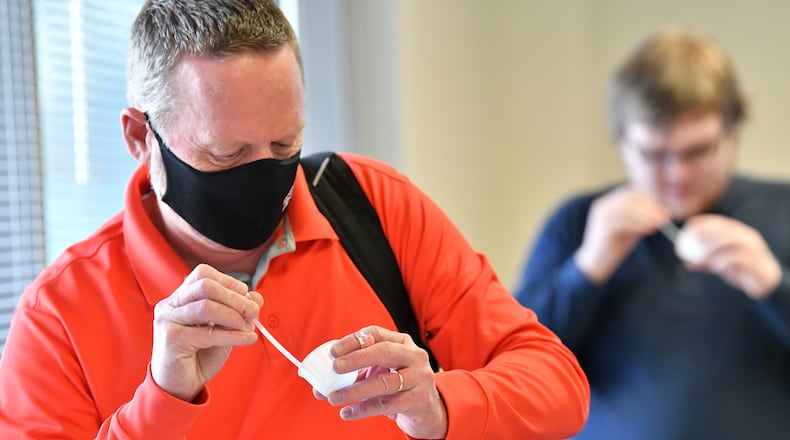COVID-19 is beginning to spread more rapidly in Georgia, but health experts warn the cases we know about are just the tip of the iceberg.
Georgia’s confirmed cases have more than quadrupled over the past two months, spurred by the emergence of several omicron subvariants that are causing outbreaks in other parts of the U.S.
The seven-day rolling average of new COVID cases in Georgia increased to nearly 1,200 on May 9, which is the most up-to-date confirmed case data from the Georgia Department of Public Health. Less than two months ago, the rolling average was about 250 daily cases of COVID.
According to the Centers for Disease Control and Prevention’s COVID data tracker tool, only two south Georgia counties stand at a “medium” level of virus in the community while the rest of the state is currently ranked “low.”
Epidemiologists from the White House to Atlanta’s own researchers said COVID’s spread is likely much worse than it appears on paper due to the prevalence of at-home tests and the number of infections that go unreported. Dr. Jayne Morgan, the executive director of Piedmont Healthcare COVID-19 task force, said infections are likely five to ten times higher than state reports, meaning Georgia is in the middle of a budding outbreak.
“We’re beyond missing the early signals,” she told The Atlanta Journal-Constitution on Monday. “We’ve passed that. We are sort of in it.”
The undercount is due to several factors. Many states, including Georgia, have begun publishing COVID-19 data on a weekly basis instead of daily, which could delay how quickly the public learns of increasing infections and hospitalizations. The recent reliance on at-home tests — spurred by a federal effort to increase test access — has also muddied the waters, because most positive at-home test results aren’t reported to state officials.
Dr. Ashish Jha, the White House COVID-19 response coordinator, said during a Wednesday news conference that the country is experiencing about 100,000 new infections each day. At-home tests are not included in that number, so some health experts estimate it’s only one-fifth or one-tenth of current infections.
“I’ve been a huge fan of home tests for the last two years,” Jha said. “But what that means is we’re clearly undercounting infections.”
At the same meeting, Dr. Rochelle P. Walensky, the director of the Centers for Disease Control and Prevention, warned that roughly a third of Americans live in a area with a high threat of COVID infection. She recommended people consider wearing a mask in indoor public settings, and the rise in infections prompted Philadelphia to reinstate mask mandates for schools.
The past two summers have featured COVID outbreaks in the South, which President Joe Biden’s administration predicts will happen again this year. However, some doctors say a silver lining is that omicron and its subvariants have brought significantly lower number of hospitalizations and deaths despite the high infection rate.
“The only thing that gives me some hope is that (hospitalizations have) stayed down for a lot longer than we have for the last couple of waves,” said Dr. John Delzell, the vice president and incident commander at the Northeast Georgia Health System.
The number of people hospitalized with COVID remains at or near the lowest number since the beginning of the pandemic. About 500 COVID patients are currently hospitalized, which is a slight increase from the past few weeks, but it pales in comparison to previous outbreaks. During the peak of the omicron wave in early 2022, there were more than 5,000 COVID hospitalizations, data shows.
Health experts worry that widespread infections could land more vulnerable people in the hospital or cause the fast-changing virus to mutate again into a strain that causes more serious illnesses or deaths.
“The cascade from infections to hospitalizations to serious illness to death provides a huge amount of information about what this version of the virus is doing,” Dr. Richard Rothenberg, an epidemiologist with Georgia State University, said in an email. “Since many people now diagnose at home ... we missed a stellar opportunity to track that.”
Deaths remain at the lowest point since the beginning of the pandemic. Georgia is averaging about two deaths per day as of May 9, which is the lowest rate since May 17, 2020. But health experts said a summertime outbreak could reverse that trend, stoking fears for what’s on the horizon.
“The good news is that omicron and all of its sub lineages ... have caused less severe disease,” Morgan said. “The bad news is that because it causes less severe disease, I think people have been a little bit more casual about public health measures and about vaccinations.”
The number of Georgians who are vaccinated has stagnated over the past few months, and nearly all public COVID precautions — such as mask mandates and mandated quarantines — have been lifted in the state. Health experts said it’s important for people to exercise caution, get vaccinated and get tested if they feel sick, especially because reinfections and breakthrough cases have become more common with omicron.
“There could be long-term consequences to this ... by allowing yourself to get infected and putting yourself at risk, you put everyone else at risk because new variants could develop,” Morgan said.
— Staff writer Helena Oliviero contributed to this report.
About the Author
The Latest
Featured



